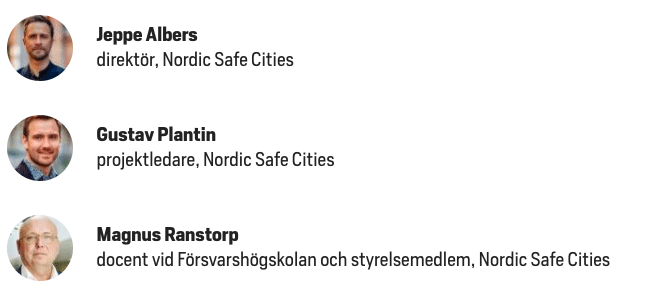DEBATE: When Extremism Crosses Borders
Categories:
News
Udgivet: 14 Sep - 2020
Strengthened Nordic co-operation is needed to combat extremism
The Danish right-wing extremist Rasmus Paludan’s provocative demonstrations in Sweden are perhaps the clearest example that extremism does not stop at the border. To prevent extremism, we need to cooperate across national and municipal borders and share successful experiences, write Nordic Safe Cities’ Jeppe Albers, Gustav Plantin and Magnus Ranstorp.
Images: Malmö (left), Copenhagen (right) – Unsplash
This weekend, Stram Kurs (Hard Line), led by Rasmus Paludan, once again announced provocative demonstrations in Sweden against the “Islamization of the Nordic countries”, with a Quran burning on the agenda. Despite the fact that the Police on Thursday (10/9) officially rejected Paludan’s demonstration application in Stockholm, there is an imminent risk that similar actions will still be carried out by right-wing extremist sympathizers, just as in Malmö two weeks ago and as in Rinkeby on Thursday. In Nordic countries, Quran burning is not a new phenomenon, but a proven method used by right-wing extremists in both Norway and Denmark in order to polarize and provoke violent reactions.
In Denmark, however, interest in these demonstrations has cooled, which possibly explains Paludan’s newfound focus on Sweden. In this respect, the Malmö incident was a great victory for the far-right phalanx to which Paludan belongs. Riots and violence by counter-protesters fitted in well with the Paludan and right-wing extremist narratives that falsely portray Muslims as a “violent imported group” that wants to stop free speech. The counter-demonstrating Malmö residents fell into the trap of the provocateurs, as did the majority of Copenhageners in the past.
To criticize Malmö’s preparedness for the violent aftermath is unfair. When the Quran burning began to gain popularity in Copenhagen, the consequences were similar. The course of events has previously proven difficult to handle, and it is therefore vital to lean on each other’s experiences and utilize lessons learned in other Nordic countries, as more Quran burnings risk inciting social unrest in Sweden. Because when extremism crosses national borders, we in the Nordic countries must stand united – with well-proven action plans – to reduce hatred and polarization in society.
In Copenhagen, after several years of experience, they have largely succeeded in reducing the burning of the Quran to a footnote in the public debate. Indifference, nonchalance and alternative narratives have proven particularly effective in curbing provocations and ensuring security in the streets – even when a right-wing extremist provocateur is urinating on a bacon-wrapped Quran in another part of the city. Experience from Copenhagen shows that it is possible to handle such demonstrations effectively. The lessons can be boiled down to five messages, aimed at municipalities and decision makers:
- Map the landscape and level of threats, including digital hate. This is needed to understand how hatred is spread, what it comprises and how it is used to mobilize violence, which contributes to a better situational picture.
- Mobilize civil society actors. Organize alternative activities for young and vulnerable persons in other parts of the city. Include and engage those who are not affiliated with religious denominations as well, who may respond in a violent manner.
- Inform about what is covered and limited under freedom of expression. Explain its structure, foundations and boundaries – what is permitted to be said and done, where are the boundaries and what happens when those are violated. Disseminate information by providing key actors, such as dialogue-and local police, imams, educators and social workers with relevant knowledge.
- Encourage people to turn their backs on the provocations. The best reaction is no reaction.
- Collaborate across national and municipal boundaries and share successful experiences. Paludan is perhaps the clearest example that extremism does not stop at the border. We therefore need more Nordic co-operation. Nordic Safe Cities, which consists of 19 member cities, constitutes such an important forum where dialogue and methodological developments and exchanges are already underway between Malmö and Copenhagen, among others.
Published: 11 september 2020 kl 10:08 in Dagens Samhälle

Read the original article in Swedish below.
Dagens Samhälle